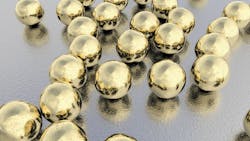In brief: Gold nanoparticles perform better than chlorhexidine, jury makes award in oral cancer case
Dentist hit with $11M verdict for failure to diagnose tongue cancer
A Pennsylvania dentist has been ordered to pay an $11 million verdict, including $8 million in punitive damages, for failing to investigate a patient's tongue sore, which turned out to be cancerous. The dentist was also accused of attempting to cover up the mistake by withholding and destroying dental records.
According to publiclawlibrary.org, “the punitive damages reflect the jury’s belief that the defendant’s actions were intentional and deserving of punishment.”1
The case underscores the critical importance of oral cancer screening and timely diagnosis or referrals, as well as the legal ramifications of withholding patient records.
DentistryIQ’s sister publication RDH has compiled several excellent resources on oral cancer screening.
If you need to brush up on the essential components of clinical documentation, see our additional resources:
The comprehensive case note: Your number-one defense witness
Are you writing SOAP notes for every dental patient? Here's why you should be
Sugar-coated gold-in-gold cage nanoparticles outperform chlorhexidine
Researchers at the University of Pennsylvania and Stanford University have devised a novel, antibiotic-free strategy for disrupting biofilm in oral plaque and wound infections: dextran-coated gold-in-gold nanoparticles.2
The photoacoustic and photothermal properties of the nanoparticles work when activated by a near-infrared laser. The sound waves emitted by the nanoparticles allow for imaging of the biofilm, and the heat generated destroys bacteria.
The technology was effective against both Streptococcus mutans and Staphylococcus bacteria. The researchers tested their strategy by applying the particles to S. mutans-infected teeth from ex vivo rat jaws. They compared its effectiveness to chlorhexidine applied to the same type of tooth sample. The study abstract writes that “these effects were over 100 times greater than those seen with chlorhexidine, a conventional antimicrobial agent. Moreover, this approach did not adversely affect surrounding tissues. We concluded that photothermal ablation using theranostic nanoparticles is a rapid, precise, and nontoxic method to detect and treat biofilm-associated infections.”3
Read last week's In Brief
Some product news in my inbox this week
Overjet gets new FDA clearance: Dental AI company Overjet has received FDA clearance for their new product, Overjet for Kids. It can now be used by dentists for children aged 4-12.
New Listerine research: This week, at the International Association for Dental Research (IADR), Kenvue, manufacturer of Listerine, is presenting new clinical data on the effectiveness of its products.
Glazer joins Balanced Pharma: Balanced Pharma has added Dr. Howard Glazer to its scientific advisory board. The startup hopes to “revolutionize” dental injectable anesthetics by creating an acid-free product.
References
- Jury awards $11 million verdict to Pennsylvania dentist for delayed cancer diagnosis and alleged cover-up. Public Law Library. February 23, 2024. https://publiclawlibrary.org/jury-awards-11-million-verdict-to-pennsylvania-dentist-for-delayed-cancer-diagnosis-and-alleged-cover-up/
- National Institute of Biomedical Imaging and Bioengineering. A golden solution quickly eliminates bacterial infections, no antibiotics required. Newswise. March 12, 2024. https://www.newswise.com/articles/a-golden-solution-quickly-eliminates-bacterial-infections-no-antibiotics-required
- Hajfathalian M, de Vries CR, Hsu JC, et al. Theranostic gold-in-gold cage nanoparticles enable photothermal ablation and photoacoustic imaging in biofilm-associated infection models. J Clin Invest. 2023;133(21):e168485. doi:10.1172/JCI168485
About the Author
Amelia Williamson DeStefano
Group Editorial Director
Amelia Williamson DeStefano, MA, is group editorial director of the Endeavor Business Media Dental Group, where she leads the publication of high-quality content that empowers oral-health professionals to advance patient well-being, succeed in business, and cultivate professional joy and fulfillment. She holds a master's in English Literature from the University of Tulsa and has worked in dental media since 2015.
Updated May 16, 2023


